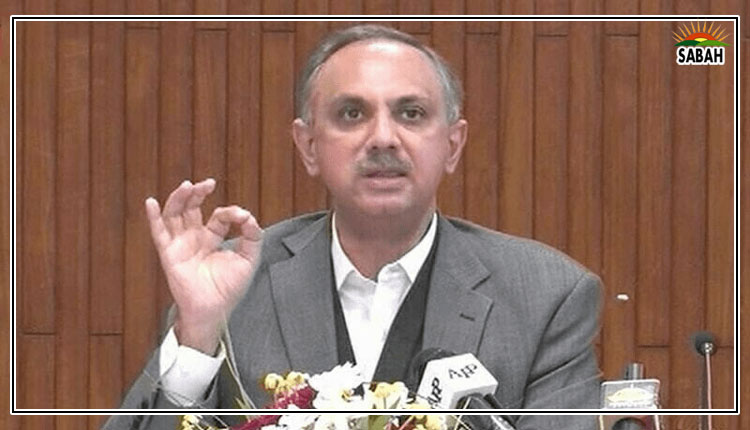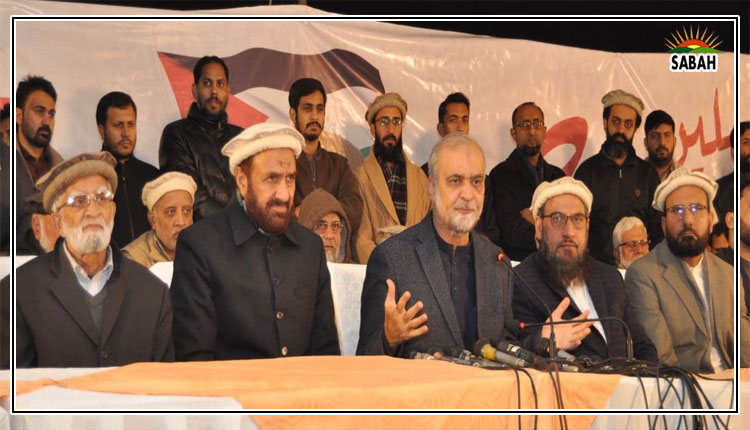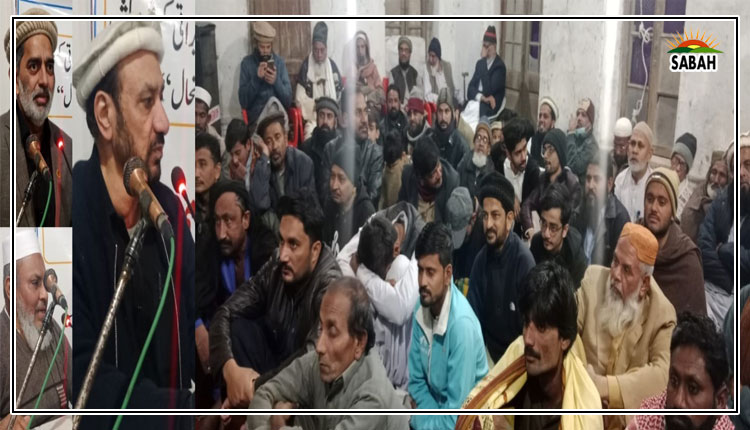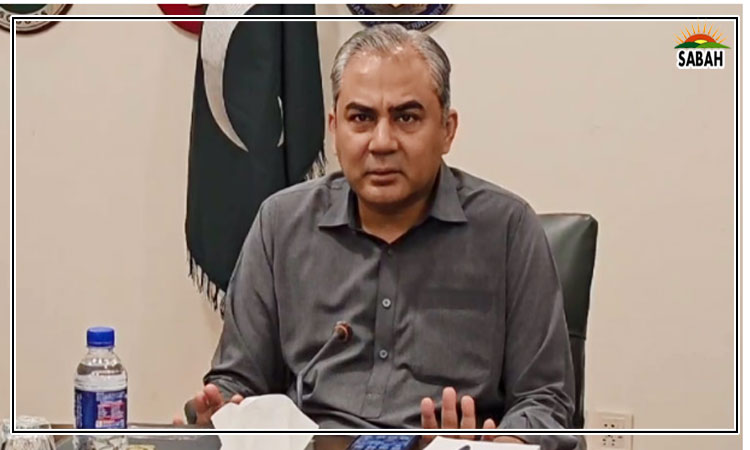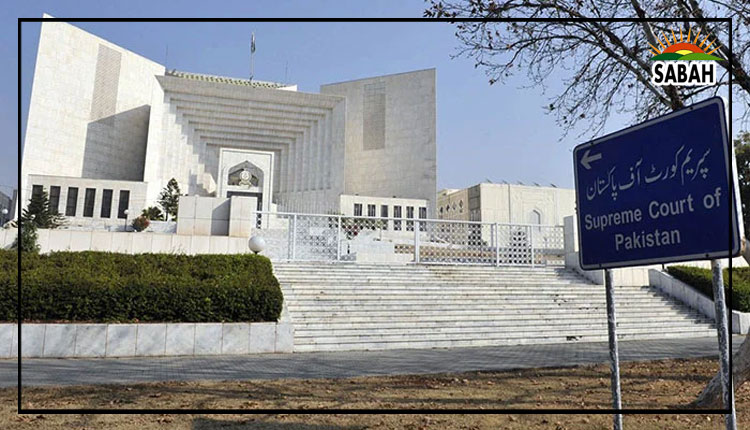Five-member larger bench of SC headed by Justice Umar Ata Bandial restores all sacked govt employees
ISLAMABAD, Dec 17 (SABAH): The Supreme Court of Pakistan on Friday restored government employees, sacked through an earlier judgment delivered by three-member bench headed by Justice Mushir Alam, which struck down the Sacked Employees (Reinstatement) Ordinance Act 2010, while exercising Court’s jurisdiction under Article 184(3) of the Constitution read with Article 187 of the Constitution. The detailed judgment will be issued later on. The court has issued short order consisting eight pages on Friday. Justice Umar Atan Bandial read out the short order in the court.
However, all review petitions in the case were dismissed by the apex court bench in a 4:1 majority decision. Justice Syed Mansoor Ali Shah dissented with the majority order, which was announced by Justice Umar Ata Bandial.
All employees from 1996 to 1999 have been reinstated by the apex court.
A five judge bench of the apex Court headed by Justice Umar Ata Bandial and comprising Justice Sajjad Ali Shah, Justice Syed Mansoor Ali Shah, Justice Qazi Muhammad Amin Ahmed and Justice Amin-Ud-Din Khan had reserved the judgment on Thursday after hearing the arguments of all the counsels in the case.
Under the verdict, the employees from Grade 1 to 7 have been reinstated unconditionally from the date of their appointment while those in Grade 8 to 17 and above will be required the passing of any aptitude or scholastic or skill test, for appointment thereon shall from the date of the judgment under review be restored to their said posts on the same terms and conditions of service applicable on the date of their initial termination.
The court order says for reasons to be recorded later, these review petitions are dismissed. The impugned legislation, namely, the Sacked
Employees (Re-instatement) Act, 2010 (“Act”) is held to be violative of, inter alia, Articles 25, 18, 9 and 4 of the Constitution of Islamic Republic of Pakistan, 1973 (“Constitution”) and therefore void under the provisions of Article 8 of the Constitution.
2. However, in exercise of the Court’s jurisdiction under Article 184(3) of the Constitution read with Article 187, we have taken into consideration the services rendered by the re-instated employees of the “employers” [as defined in Section 2(d) of the Act] and hereby order that:
i. Employees who were holding posts that on the date of their initial termination of service (from 01.11.1996 to 12.10.1999) did not require any aptitude or scholastic or skill test, for appointment thereon, shall be restored from the date of the judgment under review to the posts they were holding on the same terms and conditions of service applicable on the date of their termination pursuant to the judgment under review.
ii. Such other employees who were holding posts that on the date of their initial termination of service (from 01.11.1996 to 12.10.1999) required the passing of any aptitude or scholastic or skill test, for appointment thereon shall from the date of the judgment under review be restored to their said posts on the same terms and conditions of service applicable on the date of their initial termination.
iii. Any improvement in the terms and conditions of service of all the restored employees shall be granted strictly in accordance with the laws and rules applicable to their service or employment and in the absence thereof by regulations laid down for this purpose by their respective employers.
iv. The relief granted in sub-paragraphs (i) and (ii) above shall not be granted to employees whose initial termination of service (from 01.11.1996 to 12.10.1999) was on grounds of absence from duty, misconduct, corruption, misappropriation of money/stock or unfitness on medical grounds if such termination was not set aside finally by a Court of law.
Meanwhile Justice Mansoor Ali Shah has written dissenting note in the case and issued short note and detailed note will be issued later on.
Syed Mansoor Ali Shah, J. Parliamentary sovereignty or legislative supremacy is the cornerstone of a strong democracy. We must, therefore, recognize the central role of the legislature. Undermining the legislature undermines democracy. Both the legislature and the judicature must play their role in a spirit of profound respect for the other and within the limits set out in the Constitution. Rule of law is not merely public order, it is social justice based on public order. The law exists to ensure proper social life by balancing the needs of the society and the individual.
The courts must protect this rich concept of rule of law. Under
Article 8 of the Constitution, any law enacted by the legislature is void only to the extent it takes away or abridges fundamental rights of the people.
2. For the reasons to be recorded later and subject to ancillary and incidental declarations and orders (if any) to be made in the detailed judgment, I allow these review petitions in the following terms:
i. The judgment under review is recalled;
ii. The following Sections and part of Sections of the Sacked
Employees Reinstatement Act 2010 are declared ultra vires the Constitution:
a) Sections 4(a) and 10 to the extent of reinstatement and regularization on “one scale higher”, which give an undue advantage to the reinstated employees to the detriment of the rights of the already working regular employees and thus violate their fundamental rights. The provisions of the said Sections, except the words “one scale higher”, shall however remain operative with effect from the date of enactment of the Act, and be read to mean the reinstatement and regularization in the same or restructured, as the case may be, scale, grade, cadre, group, post or designation.
b) Sections 2(f)(vi), 11, 12 and 13, which deal with and provide for reinstatement and regularization of such sacked employees who had been dismissed, removed or terminated from service on account of absence from duty, misconduct, mis-appropriation of Government money or stock, or unfitness on medical grounds, and the determination of their guilt or medical unfitness attained finality by being unchallenged or unsuccessfully challenged. Such employees fall outside the class of sacked employees who suffered “political victimization,” envisaged by the Act for a beneficial treatment, and they by themselves do not constitute a distinct class having an intelligible differentia, which bears a reasonable relation to the object and purpose of the Act.
iii. All the employees terminated from service on the basis of the judgment under review, stand restored in the service with effect from the date they were so terminated, and shall be paid the pay of the intervening period treating the said period as an extraordinary leave with pay; and iv. The cases decided by the judgment under review, which now stands recalled, shall be deemed pending and decided on their own merits by the regular Bench(es) of this Court in accordance with the provisions of the
Sacked Employees Reinstatement Act 2010, subject to the declaration made at No. ii above.
The court order says, for reasons to be recorded later, by a majority of four to one (Justice Syed Mansoor Ali Shah dissenting), these review petitions are dismissed.
It is worth mentioning here that the government was represented by Attorney General for Pakistan Barrister Khalid Jawed Khan. Meanwhile senior lawyers Senator Mian Raza Rabbani, Senator Kamran Murtaza, Hamid Khan Advocate, Abdul Latif Afridi Advocate, Waseem Sajjad Advocate, Barrister Chauhdry Aitzaz Ahsan, Sardar Muhammad Latif Khan Khosa, Syed Iftikhar Hussain Gillani Advocate, Asghar Hussain Sabzwari Advocate and others represented the sacked employees




